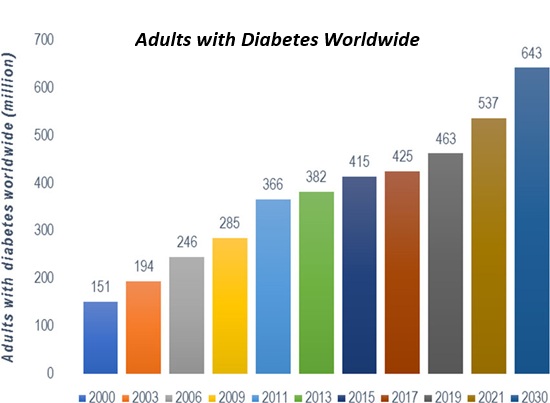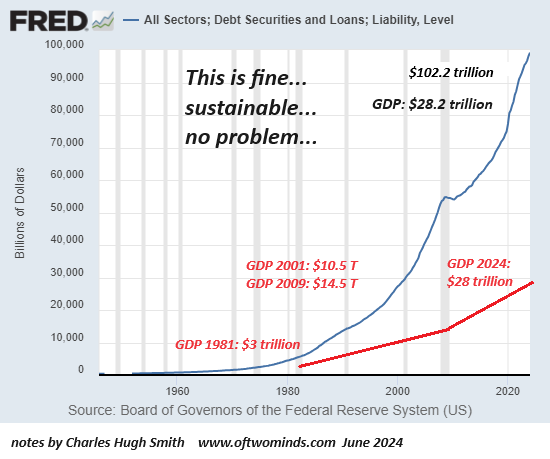The global recession will be deeper and longer than those relying on models based on the past two decades of hyper-globalization and hyper-financialization anticipate.
While everyone focuses on conflicts between nations, few look at the problems shared by nations. Richard Bonugli and I discuss both sets of problems in our latest podcast.
The conflict sphere is dominated by the trade wars that are bubbling up here in the first inning of the global rebalancing of national interests and global trade/financial frameworks. Supporting these frameworks benefits participating nations until they don’t, at which point they’re jettisoned.
The conviction that these frameworks, linch-pinned by the U.S. since the end of World War II in 1945, no longer serve America’s core national security interests, is reaching a rough consensus, and as a result some describe the U.S. as a "rogue superpower." In other words, now that the U.S. is no longer the dumping ground for global surpluses of production, it’s seen as "going rogue."
There’s a certain naivete in the notion that any nation acts selflessly for the good of all. All nation-states act in their own interests, just as global corporations act to optimize shareholder value and profits while proclaiming the wonderfulness of their products and services. Nations support cooperative arrangements when it benefits them, and exit those arrangements when they morph from benefit to burden.
This rebalancing of cooperation and self-interest is taking place in the larger context of non-trade problems shared by all developed nations. Developing nations share many of these same problems as well: soaring debt loads, resource scarcities, corruption, mal-investment, high inflation, stagnating economies, aging populations, shrinking workforces, rising social costs and massive public health issues, many of which have been expanding rapidly behind the focus on trade and conflicting interests.
The ubiquity of these issues is striking. In some ways, developed nations share more problems than they seem to realize. Consider the global rise of lifestyle diseases generated by dramatic shifts in diets and fitness. These manifest as metabolic disorders (prediabetes, diabetes) and a broad range of other chronic diseases such as heart disease and cancers.
Metabolic disorders generated by changing lifestyles are now weighing heavily on nations around the world, from the U.S. and Mexico to China, India, the Mideast and beyond. 
The problems generated by aging populations and declining birth rates are also shared by many nations. The same is true of rising debt levels, both public and private, which threaten to destabilize economies via either ruinously high inflation or fiscal frugality, i.e., austerity. Here is total credit in the U.S., a sobering chart that mirrors the debt loads of many other nations--debt that is outstripping GDP and income as interest rates rise in the new era of global inflationary forces. 
The world’s nations have awakened to the risks of becoming dependent on other nations for essential commodities, manufactured goods, and markets. Tariffs may well be merely the at-bat players in the first innings. If history is any guide, outright bans on imports from selected nations will eventually be viewed as the only available option to rebalance national security priorities.
The degrees of national dependence will become increasingly consequential as mercantilist nations that have relied on exports for growth will find markets for their exports shutting down, crippling domestic growth. Nations that attempt to become self-sufficient will find that the demands for capital investment will pressure consumer spending, even as the decline of cheap imports institutionalizes inflation and price increases that outstrip wage increases.
Stagflation will hinder both investment and consumer spending. Austerity will crimp fiscal borrowing and spending, and capital sloshing around the world seeking low-risk returns will face unprecedented challenges as capital controls proliferate and nations change the rules overnight.
I often focus on scale because this is a limiting factor. While there may well be growth opportunities for investing in developing nations, the scale of capital sloshing around global markets will find the investment pipelines the equivalent of a straw: there is no way to deploy $100 billion in small markets and economies, never mind $1 trillion or $10 trillion.
As Immanuel Wallerstein observed, Capitalism may no longer be attractive to capitalists as all these dynamics play out in a vast, inter-connected, unpredictable rebalancing of global interests and increasingly destabilizing attempts to solve complex, intractable problems with cobbled-together expediencies or doing more of what’s already failed.
There won’t be any "saves" in this rebalancing, and so the global recession will be deeper and longer than those relying on models based on the past two decades of hyper-globalization and hyper-financialization anticipate.
